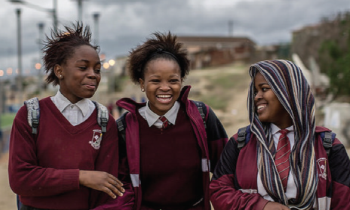What International Women’s Day Means to Me

Today’s guest blogger is Francine Nabintu, a McCain Institute Next Generation Leader from the Democratic Republic of the Congo.
Seven months ago, I packed my bags and made the 9,000 mile journey from the Democratic Republic of the Congo (DRC)―my home country―to San Francisco. It’s been an incredible and eye-openingexperience for myself, my husband, and my five children. As a McCain Institute Next Generation Leader, I was granted a once-in-a lifetime opportunity to work alongside Futures Without Violence, an organization whose mission very much aligns with my own.
Before coming to America, I worked with an organization called HEAL Africa to promote the rights of women in the  DRC and address many of the underlying causes of gender-based violence. I had the opportunity to work with a variety of people, including survivors of domestic and sexual violence, other activists, and men in the community to help promote respect for women. With today being International Women’s Day, I find myself reflecting on the experiences that have helped lead me down this path and solidified my commitment to preventing and ending gender-based violence.
DRC and address many of the underlying causes of gender-based violence. I had the opportunity to work with a variety of people, including survivors of domestic and sexual violence, other activists, and men in the community to help promote respect for women. With today being International Women’s Day, I find myself reflecting on the experiences that have helped lead me down this path and solidified my commitment to preventing and ending gender-based violence.
I’ll never forget Mrs Munkira, a brave woman whom I met in my hometown of Goma.
She told me, “Today I am old. I survived years of violence in my home. Although things are better today, I wish it could have happened earlier. Our home could have been a little paradise on earth.”
When I heard this, I became very emotional and was about to cry. I realized that the HEAL Africa program for men in the community was having a positive effect.
The women’s daughter, who was in her twenties, went on to tell me what things were like when she was young. She recalled that her mother was never happy. She had never seen her parents walking  together―because her mother was not treated as an equal in her father’s eyes. The daughter explained that her mother never had access to her husband’s income, and had no choice but to wear old and weathered clothing.
together―because her mother was not treated as an equal in her father’s eyes. The daughter explained that her mother never had access to her husband’s income, and had no choice but to wear old and weathered clothing.
“All my neighbors can tell how I used to survive,” said the old woman. “Our family suffered for many years but recently, there has been a positive change, and my husband made it possible for the kids to return to school. Now, he comes home and includes me in decisions.”
On this International Women’s Day, I’m reminded of the many women in the DRC who are forced to live in violent relationships because of social norms and economic constraints. But I also want to celebrate the many resilient women and girls who have survived. Thanks to all of you who join me in supporting women’s empowerment and equal opportunities!





